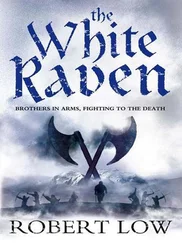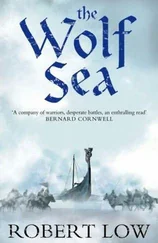It ended, I remember, with the first of the recruits climbing the shoreplank to the deck of the Elk, where Einar waited. Gunnar Raudi and Ketil Crow and others had been out spreading the word everywhere that the fine ship and its hard crew were looking for good men not afraid to swear a varjazi oath to each other and live with the consequences of that.
When we got back to the ship, we had to push through a throng of them, all out for a piece of the luck that had gained Einar's crew riches and a fine ship. I wanted to shout out the truth to them, but thought better of it.
`Six skills I know,' I heard one say. 'I play 'tafl and scarcely make a mistake reading runes now. I can row and ski and shoot and use both spear and sword.'
And they were all variations of that. Those who passed Einar's scrutiny—I never knew what he saw, one way or the other—were tallied up by Illugi and told of the oath they would swear, in a ceremony to be arranged when we had all the men we needed.
When Einar was unsure, he would turn to Ketil Crow and raise an eyebrow and that man would wave a languid hand and ask something like: 'You are coming to a hall for the first time, walking up to it uninvited as a guest, but certain of hospitality nonetheless. What are you looking for?'
Those who answered that they were making sure where the doors were, in case they had to get out in a hurry, were hired. Those who stammered, or looked lost, or grinned and said 'the women' were sent away.
On the day of the stone-raising we had tallied up the last of them—the most Oathsworn that had been, according to Valknut. One hundred and twenty of us, almost the full complement of a drakkar, and Einar had thought carefully about what came next.
He had bought two fighting stallions, would match them as was the custom, then sacrifice the winner to Odin. On that altar of ground the Oathsworn—all of us—would swear the oath that bound us together once more. Even Einar.
It had been Illugi Godi's idea and, judging by the way luck had been running, Einar was probably right to think there was a chance it would work. He was still working his way to Atil's hidden hoard, sending Illugi to try to flush out any references to it, like ducks from a marsh, while giving nothing away himself.
I did not put my thought—that there was no stone raised to Eyvind anywhere—to either him or Illugi.
But the wyrd was working on Einar and, on that very day, it caught up with us all.
A few days after the stone-raising, the Oathsworn gathered on the Thingvallir, a patch of grass-tufted ground just outside the walled stockade of Aldeigjuborg.
It stretched along the river southwards and had a large flat altar-like stone embedded in it, near which the town had erected a wooden totem statue to Perun. Since, with his hammer and his big, brave bearded face, he was so like Thor as to be his brother, this satisfied Norse and Slav alike. Even though the Great Prince of Kiev, Sviatoslav, wasn't a Christ-follower like his mother, Olga—who was sainted for it later—he was tolerant enough. After all, he was half Khazar and they, I had been told, had chosen to follow the faith of the wandering Moses-men, which seemed beyond kenning; not only were they the very ones the Christ-men hated for having, they swore, killed their Christ, but the original Jewishmen were in Serkland, many miles away, and everyone else around was a Mussulman. Perhaps that was why Sviatoslav fought them, though some said it had more to do with them dominating the eastern trade routes.
Others, round the fires of a night, said that the Khazars were descendants of the Huns and had been sky-worshippers until not so long since. They had changed religion, these men assured us, because their chiefs, whom they called khans, were elected as being favoured of the gods. If they failed just once, it meant the gods no longer favoured them, so they were killed; naturally they thought it a good idea to change this religion. And they had chosen the god of the Jews because they had Christ-men on one side and Mussulmen on the other and thought it deep-minded cunning not to annoy their neighbours.
There were a few dark glances shot at Einar over this and a couple of muttered comments about how the original Khazar religion seemed smarter. If Einar heard it, he made no sign.
But the whole thing was puzzling, that you could put on gods like a cloak on a cold morning. The more I discovered about the gods of the world, the more of a mystery they seemed to be and, for all my long years, I have still not fathomed it.
Once or twice a year, then, the scraggy black cattle and big-fleeced sheep were scattered off this Thingvallir and it was used to settle lawsuits and discuss, in public, town matters.
In reality, the town was run like Birka, by a group of the richest merchants, all elected by each other.
Now and then it pleased them to make it appear that everyone had a say.
The status of Aldeigjuborg was awkward. Originally, the Svears had founded it as a trade centre and it was still supposed to be a part of what would become Sweden during my lifetime, when Olaf, the Lap King, united the Svears and Geats.
Since there was no Sweden and no strong ruler of the Svears—at that time, no one even knew who it was, only that there was a fight for it—the town went its own way and the Norse ran it.
But it was full of foreigners—Slavs and Khazar merchants, mainly—and Sviatoslav and his bold sons were stamping their mark, carving out a Rus kingdom from Kiev, in all directions. They controlled Novgorod, which we called Holmgard and, in all but name, held Aldeigjuborg as well and preferred to call it Starya Ladoga.
Einar had made it known that the Oathsworn would be having a ceremony on the Thingvallir, to coincide with the festival of the Dawn Goddess, Ostara, the one the Saxons call Eostre and the Christ-men were calling Easter. Hundreds turned up to help broach the barrels of mead and ale and wolf their way through acres of spit-roasted meats.
Of course, a few grumbled about the fact that there was no Year King to sacrifice, only a good horse, but they were old and remembered the old ways. No one seriously thought these days about burying a Year King in the field and eating bread made from that grain to share the miracle of rebirth.
Nor were the Greek priests, brought from Constantinople by Sviatoslav's mother, a barrier, since they celebrated the festival, too, it appeared. Illugi Godi, of course, was enraged by this.
`See them,' he railed, as the gorgeously accoutred priests paraded down the muddy walkways, swinging censers and droning. Ìt's not enough that they should declare the true gods are nothing short of paltry bandits, but they have the nerve to steal our worship for their own.' He paused and hawked loudly, then spat.
The nearest priest turned, beard quivering, and saw Illugi, recognised the staff and scowled.
`Turds; Illugi growled. 'Easter, they call this, as if we can't see they have stolen it.'
`Maybe they already had a festival of their own,' offered my father, scrubbing his head as he did when he was unsure.
`Ha! And a god who hung on a tree and was stabbed with a spear?' Illugi argued, thumping his staff on the walkway.
My father looked at me, shrugged and gave up. I grinned. It was, after all, a celebration of my Name Day.
Neither of us could actually remember the exact day, my father being drunk at the time, as he admitted, so I had always celebrated changing age at the festival of Ostara.
And, in this one, I was now sixteen years old and a man.
Not that that mattered to Einar—later, as the mead and meat was being enjoyed, I was standing guard to Hild, watching and sober. Valknut, well drunk, was trying his hand with the flamestick belonging to some fire-dancers. The spear-length, burning at either end, was tricky at the best of times but the lean fire-dancer spun it round his body expertly. Valknut, in contrast, had twice set his hair on fire trying it and Gunnar Raudi, the second time, was gasping with too much laughter to help him put it out. In the end, he threw the contents of his ale horn over Valknut, who went around for a long time with a strange, lopsided hairstyle and the trailing smell of his charred locks.
Читать дальше
Конец ознакомительного отрывка
Купить книгу











